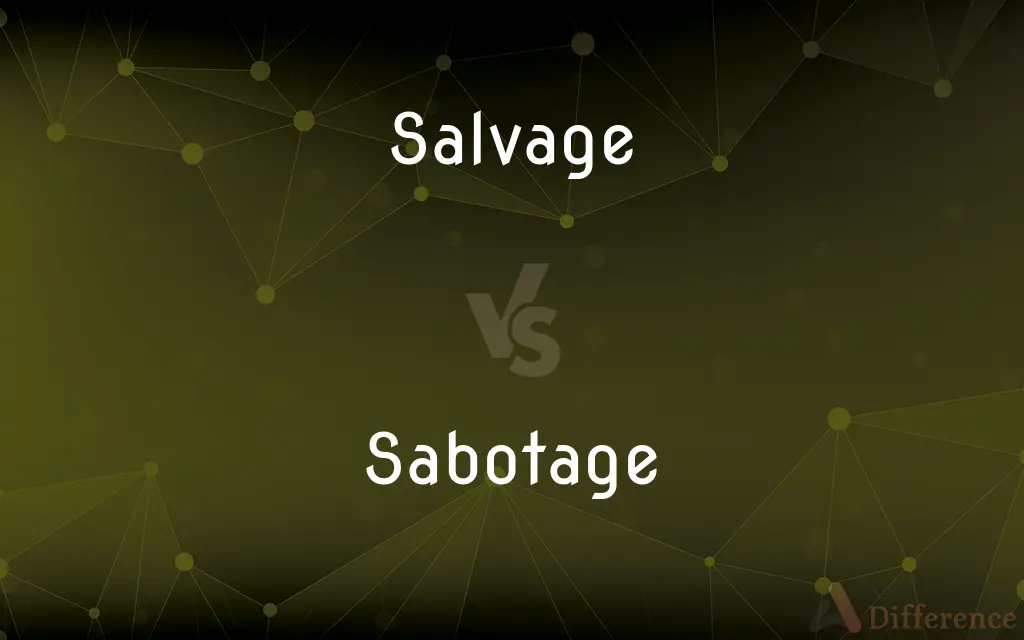Salvage vs. Sabotage — What's the Difference?
By Maham Liaqat & Fiza Rafique — Updated on March 28, 2024
Salvage involves rescuing or saving something from loss or damage, focusing on recovery and preservation, whereas sabotage is the deliberate act of destroying or damaging something to hinder operations or success.

Difference Between Salvage and Sabotage
Table of Contents
ADVERTISEMENT
Key Differences
Salvage is primarily about recovery and preservation, aiming to save property, goods, or situations from complete loss or destruction. It involves efforts to repair, restore, or retrieve what is at risk of being lost. On the other hand, sabotage is the intentional act of causing harm or destruction, often for personal, political, or economic gain, aimed at disrupting or undermining the effectiveness of an operation, project, or entity.
The intention behind salvage operations is constructive, seeking to minimize loss and restore functionality or value to damaged or endangered items. Whereas, sabotage is inherently destructive, motivated by a desire to obstruct or derail processes, projects, or machinery, often through covert or underhanded means.
Salvage can be seen across various contexts, including maritime rescue, data recovery, and environmental protection efforts, highlighting its versatility in preserving life, information, and nature. On the contrary, sabotage spans activities like industrial espionage, cyber-attacks, and vandalism, reflecting its broad applicability in disrupting systems and structures.
Professionals involved in salvage operations, such as salvage engineers and environmentalists, are driven by principles of conservation and restoration. Conversely, individuals who engage in sabotage, including hackers, activists with extremist views, or disgruntled employees, are motivated by goals that seek to challenge, protest against, or undermine certain activities or establishments.
Despite their opposite objectives, both salvage and sabotage require a deep understanding of the systems they are dealing with, whether to save or to subvert. The former employs this knowledge to protect and preserve, while the latter uses it to exploit vulnerabilities and inflict damage.
ADVERTISEMENT
Comparison Chart
Objective
To recover and preserve.
To disrupt and destroy.
Motivation
Constructive, aiming at restoration.
Destructive, aiming at obstruction.
Contexts
Maritime, environmental, data recovery.
Industrial, cyber, political.
Key Activities
Repairing, restoring, retrieving.
Destroying, hindering, vandalizing.
Professionals
Salvage engineers, environmentalists.
Hackers, activists, disgruntled employees.
Compare with Definitions
Salvage
The process of saving something from danger, damage, or destruction.
The team's quick response helped to salvage the sinking ship.
Sabotage
Deliberate action aimed at weakening an entity through subversion, obstruction, disruption, or destruction.
The machinery breakdown was a result of industrial sabotage.
Salvage
To recover something valuable from a bad situation.
Despite the project's setbacks, the team managed to salvage some key data.
Sabotage
Undermining a cause or effort intentionally.
The leaked emails were an attempt to sabotage the negotiation process.
Salvage
Efforts to restore or repair damaged property.
After the fire, salvage operations helped recover many priceless artworks.
Sabotage
Political sabotage to influence outcomes or perceptions.
The campaign was accused of attempting to sabotage its opponent's reputation.
Salvage
Data salvage from failed or damaged storage devices.
The IT specialist successfully performed data salvage on the crashed server.
Sabotage
To deliberately destroy or damage property to hinder operations.
Vandals sought to sabotage the event by cutting power lines.
Salvage
Environmental salvage to protect ecosystems.
Salvage logging was initiated to clear damaged trees after the storm.
Sabotage
Cyber sabotage involving attacks on digital infrastructure.
Hackers launched a sabotage campaign against the company's servers.
Salvage
The rescue of a ship or its cargo from fire or shipwreck.
Sabotage
Sabotage is a deliberate action aimed at weakening a polity, effort, or organization through subversion, obstruction, disruption, or destruction. One who engages in sabotage is a saboteur.
Salvage
The ship or cargo saved in such a rescue.
Sabotage
The deliberate destruction of property or obstruction of normal operations, as by civilians or enemy agents in a time of war.
Salvage
Award given to those who aid in such a rescue when under no obligation to do so, especially in the form of a portion of the cargo.
Sabotage
The deliberate attempt to damage, destroy, or hinder a cause or activity.
Salvage
The recovery of a sunken ship or its cargo by divers or submersibles.
Sabotage
To damage, destroy, or hinder (something) by sabotage.
Salvage
The act of saving imperiled property from loss.
Sabotage
A deliberate action aimed at weakening someone (or something, a nation, etc) or preventing them from being successful, through subversion, obstruction, disruption, and/or destruction.
Salvage
The property so saved.
Sabotage
To deliberately destroy or damage something in order to prevent it from being successful.
The railway line had been sabotaged by enemy commandos.
Our plans were sabotaged.
Salvage
Something saved from destruction or waste and put to further use.
Sabotage
Scamped work.
Salvage
To save from loss or destruction.
Sabotage
Any surreptitious destruction of property or obstruction of activity by persons not known to be hostile; - in war, such actions carried out behind enemy lines by agents or local sympathisers of the hostile power.
Salvage
To save (discarded or damaged material) for further use.
Sabotage
A deliberate act of destruction or disruption in which equipment is damaged
Salvage
The rescue of a ship, its crew and passengers or its cargo from a hazardous situation.
Sabotage
Destroy property or hinder normal operations;
The Resistance sabotaged railroad operations during the war
Salvage
The ship, crew or cargo so rescued.
Salvage
The compensation paid to the rescuers.
Salvage
The money from the sale of rescued goods.
Salvage
The similar rescue of property liable to loss; the property so rescued.
Salvage
Anything put to good use that would otherwise have been wasted, such as damaged goods.
Salvage cars auction
Salvage
Obsolete spelling of savage.
Salvage
(Philippines) summary execution, extrajudicial killing.
Salvage
To rescue.
Salvage
To put to use.
Salvage
(transitive) To make new or restore for the use of being saved.
Salvage
(Philippines) To perform summary execution.
Salvage
(Philippines) To apprehend and execute (a suspected criminal) without trial.
Salvage
The act of saving a vessel, goods, or life, from perils of the sea.
Salvage of life from a British ship, or a foreign ship in British waters, ranks before salvage of goods.
Salvage
The compensation allowed to persons who voluntarily assist in saving a ship or her cargo from peril.
Salvage
Savage.
Salvage
Property or goods saved from damage or destruction
Salvage
The act of saving goods or property that were in danger of damage or destruction
Salvage
The act of rescuing a ship or its crew or its cargo from a shipwreck or a fire
Salvage
Save from ruin, destruction, or harm
Salvage
Collect discarded or refused material;
She scavenged the garbage cans for food
Common Curiosities
What is the primary goal of salvage operations?
The primary goal is to recover and preserve goods, property, or information from total loss or destruction.
How does sabotage affect businesses?
Sabotage can lead to significant operational disruptions, financial losses, and damage to a business's reputation.
What motivates individuals to commit sabotage?
Motivations can range from political and economic reasons to personal grievances or ideological beliefs.
What role do salvage engineers play?
Salvage engineers specialize in planning and executing operations to recover damaged or endangered properties and goods.
Can sabotage be legal or justified?
While sabotage is generally illegal and unethical, some may view it as justified in certain contexts, such as in acts of civil disobedience for perceived social or environmental justice. However, these actions are subject to legal and ethical scrutiny.
Is data recovery considered a form of salvage?
Yes, data recovery is a form of salvage focused on retrieving lost or damaged digital information.
Can sabotage be accidental?
Sabotage is characterized by its deliberate nature; accidental damage or disruption does not qualify as sabotage.
Can salvage operations involve environmental protection?
Yes, environmental salvage operations aim to protect ecosystems from damage or to restore them after disasters.
Are there international laws against sabotage?
Yes, there are international and national laws designed to prevent and penalize acts of sabotage, especially those that threaten national security or critical infrastructure.
How can sabotage be prevented?
Preventing sabotage involves security measures, vigilance, and fostering a positive organizational culture to deter malicious actions.
How does sabotage impact the environment?
Environmental sabotage can cause irreparable harm to ecosystems, wildlife, and natural resources.
Can sabotage be a form of protest?
While some may use sabotage as a protest tactic, it is generally considered illegal and ethically problematic due to its intent to harm or destroy.
How do salvage operations benefit society?
Salvage operations play a crucial role in minimizing loss, preserving cultural and material resources, and protecting the environment, contributing to societal resilience and sustainability.
What is the difference between salvage and recycling?
Salvage focuses on saving and preserving from damage or loss, while recycling involves processing materials to make them reusable in a new form.
What is digital salvage?
Digital salvage refers to the recovery of data from damaged, failed, or obsolete digital storage devices.
Share Your Discovery

Previous Comparison
Underdetermined vs. Overdetermined
Next Comparison
Aboma vs. BoaAuthor Spotlight
Written by
Maham LiaqatCo-written by
Fiza RafiqueFiza Rafique is a skilled content writer at AskDifference.com, where she meticulously refines and enhances written pieces. Drawing from her vast editorial expertise, Fiza ensures clarity, accuracy, and precision in every article. Passionate about language, she continually seeks to elevate the quality of content for readers worldwide.
















































